🕊️ Introduction: Maulana Abul Kalam Azad: The Torchbearer of India’s Intellectual Freedom
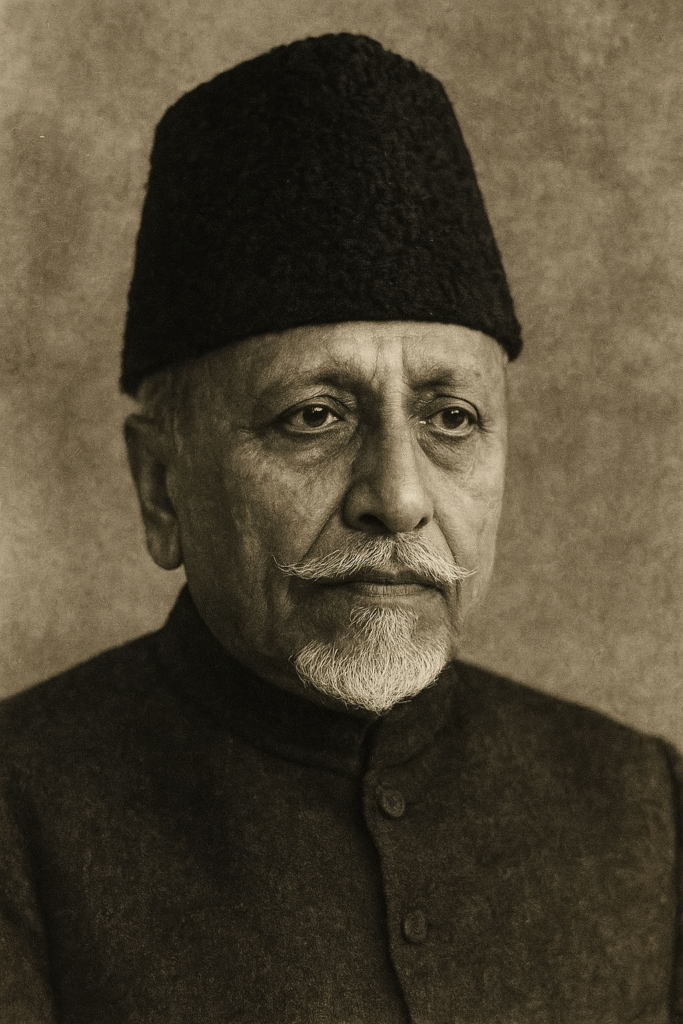
In the grand tapestry of India’s freedom struggle, few names shine with the brilliance of Maulana Abul Kalam Azad. He was not just a freedom fighter—he was a philosopher of liberty, a poet of resistance, and a visionary who believed that education was the soul of a nation. Born in Mecca in 1888 and raised in Calcutta, Maulana Abul Kalam Azad embodied the fusion of deep Islamic scholarship and modern nationalist thought. His life was a testament to the power of words, ideas, and unwavering conviction.
Maulana Abul Kalam Azad was a man of paradoxes—deeply spiritual yet fiercely political, rooted in tradition yet radically progressive. He did not merely fight for independence from British rule; he fought for the emancipation of the Indian mind. His pen, through journals like Al-Hilal and Al-Balagh, became a weapon sharper than any sword. Through these publications, Maulana Abul Kalam Azad challenged colonial narratives, awakened the youth, and laid the intellectual foundation for a free India.
From a young age, Maulana Abul Kalam Azad displayed a thirst for knowledge that defied boundaries. Fluent in Arabic, Persian, Urdu, and English, he devoured texts ranging from Islamic theology to Western philosophy. This eclectic education shaped his worldview—one that saw India not as a land divided by religion, but as a unified civilization bound by shared suffering and collective hope. Maulana Abul Kalam Azad believed that true freedom could not be achieved without unity, and he dedicated his life to bridging communal divides.
As a leader of the Indian National Congress, Maulana Abul Kalam Azad stood shoulder to shoulder with giants like Mahatma Gandhi, Jawaharlal Nehru, and Sardar Patel. Yet his voice was distinct—calm, reasoned, and deeply moral. In 1923, he became the youngest President of the Congress, and again held the position from 1940 to 1946, during some of the most turbulent years of India’s struggle. His leadership was marked by courage, especially during the Quit India Movement, when Maulana Abul Kalam Azad was imprisoned for his defiance against British tyranny.
But Maulana Abul Kalam Azad’s legacy extends far beyond politics. As independent India’s first Minister of Education, he laid the foundation for a nation that would value learning as its highest virtue. He championed the creation of institutions like the University Grants Commission (UGC), Indian Institutes of Technology (IITs), and cultural academies that celebrated India’s artistic soul. For Maulana Abul Kalam Azad, education was not just about literacy—it was about liberation. He believed that an educated citizen was the strongest pillar of democracy.
Maulana Abul Kalam Azad’s speeches were symphonies of intellect and emotion. His words carried the weight of centuries and the fire of revolution. He spoke not to incite, but to inspire. His famous declaration—“I am proud to be an Indian. I am part of that indivisible unity that is Indian nationality”—still echoes in the hearts of those who believe in secularism, pluralism, and national unity. Maulana Abul Kalam Azad did not see India as a patchwork of religions; he saw it as a mosaic of cultures, each contributing to the nation’s soul.
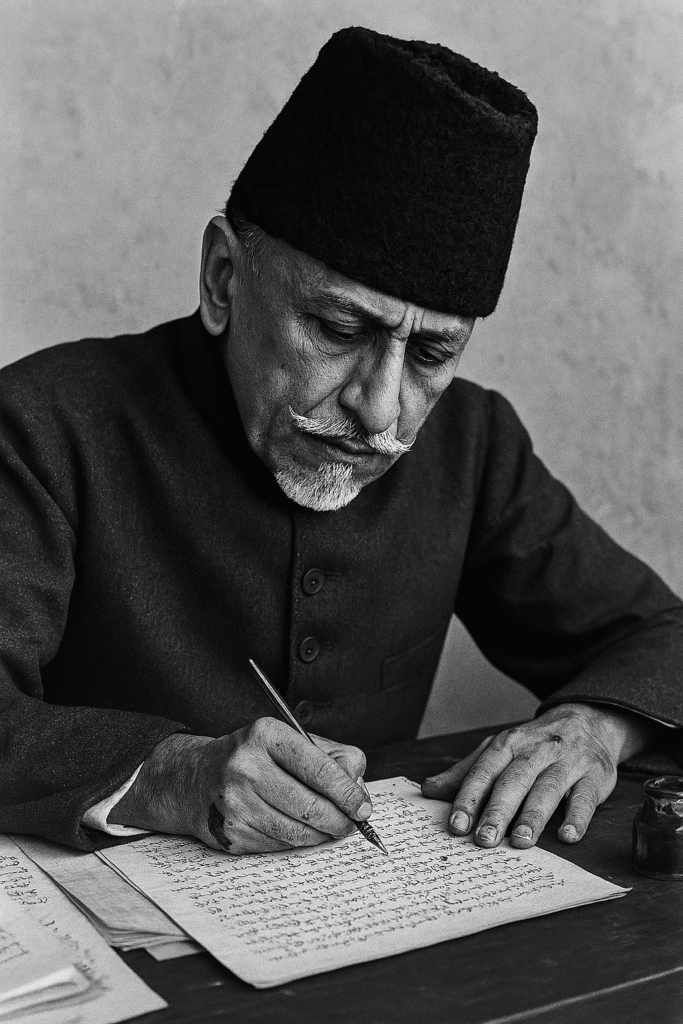
Throughout his life, Maulana Abul Kalam Azad faced criticism, isolation, and political opposition. Yet he never wavered. He opposed the partition of India, believing it would tear apart the fabric of centuries-old coexistence. His stance was not popular, but it was principled. Maulana Abul Kalam Azad believed that leadership meant standing firm, even when the tide turned against you. His moral compass never faltered, and his legacy remains a beacon for those who choose principle over popularity.
In 1956, Maulana Abul Kalam Azad was awarded the Bharat Ratna, India’s highest civilian honor. It was a recognition not just of his service, but of his spirit. Two years later, on February 22, 1958, he passed away in Delhi, leaving behind a nation forever indebted to his vision. His resting place near Jama Masjid is not just a grave—it is a shrine to intellectual courage and national unity..
In 1956, Maulana Abul Kalam Azad was awarded the Bharat Ratna, India’s highest civilian honor. It was a recognition not just of his service, but of his spirit. Two years later, on February 22, 1958, he passed away in Delhi, leaving behind a nation forever indebted to his vision. His resting place near Jama Masjid is not just a grave—it is a shrine to intellectual courage and national unity..
Today, Maulana Abul Kalam Azad is remembered not just as a freedom fighter, but as a builder of modern India. His birthday, November 11, is celebrated as National Education Day—a tribute to his belief that education is the true engine of progress. For the youth of India, Maulana Abul Kalam Azad remains a symbol of what it means to think freely, speak fearlessly, and act morally.
In a world increasingly divided by ideology and identity, the life of Maulana Abul Kalam Azad offers a roadmap to unity. He taught us that freedom is not just political—it is personal, intellectual, and spiritual. He showed that true leadership is not about domination, but about dialogue. And above all, Maulana Abul Kalam Azad proved that the pen, when guided by principle, can shape the destiny of a nation.
As we reflect on his legacy, let us not merely remember Maulana Abul Kalam Azad. Let us revive him—in our classrooms, our conversations, and our conscience. Let us carry forward his dream of an India where every child learns, every citizen thinks, and every community thrives. For in the words of Maulana Abul Kalam Azad himself: “Education imparted by heart can bring revolution in the society.”\
Table of Contents
🗣️Historical Speech: Maulana Abul Kalam Azad at Jama Masjid
- 📅 Date: 23 October 1947
- 📍 Location: Jama Masjid, Delhi
- 👥 Crowd: Thousands of Indian Muslims gathered in the courtyard, many uncertain about their future in post-Partition India
- 🎯 Motive: To urge Muslims to stay in India, reaffirm their identity as Indians, and reject the fear and division caused by Partition
🔥 Context & Message
Just two months after India’s independence and the traumatic Partition, Maulana Abul Kalam Azad stood before a restless crowd at Shah Jahan’s historic Jama Masjid. Many Muslims were contemplating migration to Pakistan, fearing persecution or isolation. Azad, deeply pained by the communal violence and division, rose to speak—not as a politician, but as a guardian of India’s soul.
He began with the words:
“My brethren, you know what has brought me here today.”
Azad reminded the crowd that he had addressed them many times before in that very mosque, but never under such tragic circumstances. He spoke of the shared history of Hindus and Muslims, the centuries of coexistence, and the moral duty to preserve India’s unity.
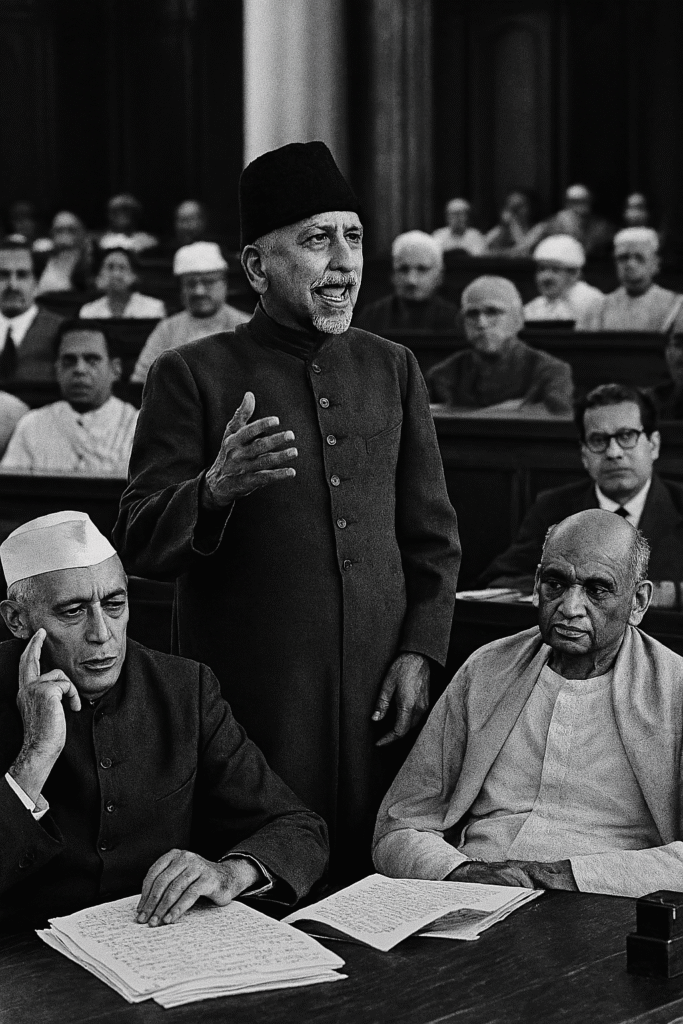
He declared:
“Do not forget that you are the inheritors of the legacy of India. This is your homeland. You are not guests here.”
Azad’s voice was firm, his tone sorrowful yet resolute. He condemned the idea that Muslims should feel alienated in India. He urged them to reject fear, resist communal propaganda, and reclaim their place as equal citizens of a free India.
🕊️ Impact & Legacy
This speech became a defining moment in post-independence India. It was a call to conscience, a plea for unity, and a rejection of communal division. Azad’s words helped calm tensions, restore faith, and reaffirm the secular foundation of the Indian republic.
His message still resonates today:
“India is not a piece of land—it is a soul. And you are part of that soul.”
🧒 The Making of Maulana Abul Kalam Azad: A Childhood Forged in Faith, Fire, and Freedom
Maulana Abul Kalam Azad was not born into comfort—he was born into conviction. On 11 November 1888, in the sacred city of Mecca, Hejaz (then under Ottoman rule), a child entered the world whose voice would one day echo across continents. His birth wasn’t just a date—it was the beginning of a legacy. Born to a family of Indian scholars and spiritual leaders, Maulana Abul Kalam Azad inherited a lineage steeped in Islamic scholarship, resistance, and migration. His father, Maulana Khairuddin, had left India after the 1857 revolt, seeking refuge in Mecca. His mother, of Arab descent, added another layer of cultural depth to his upbringing.
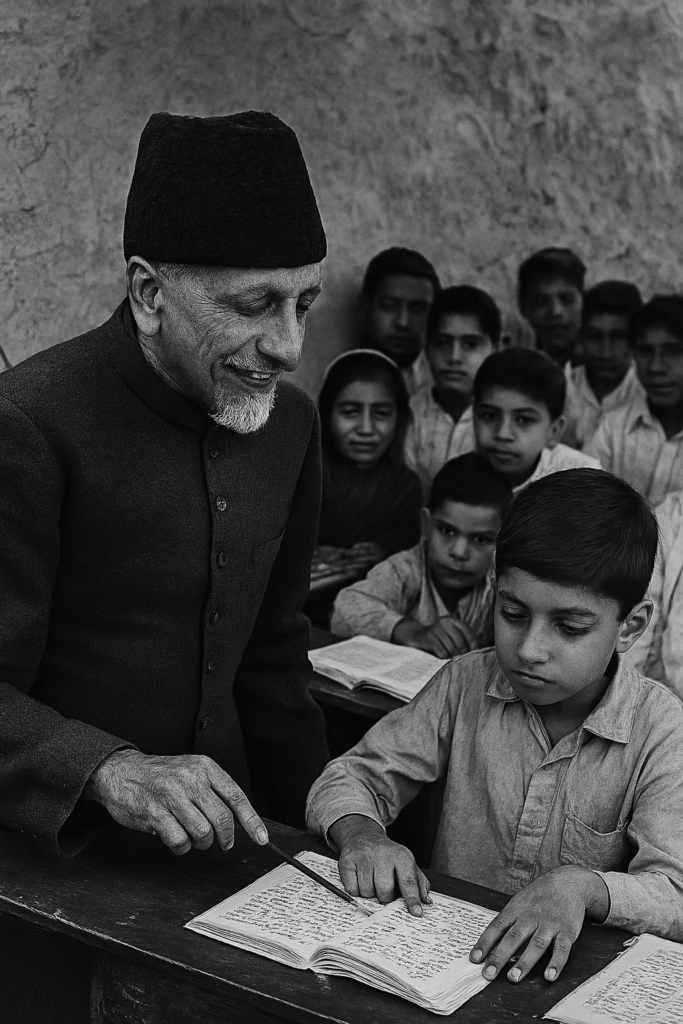
From the very beginning, Maulana Abul Kalam Azad was surrounded by ideas, scriptures, and stories of struggle. His name—Muhiyuddin Ahmad—would later evolve into the iconic identity we know today. But even as a child, he was not ordinary. He was absorbing the world with intensity, listening to debates, reading scriptures, and questioning norms. His early exposure to religious discourse laid the foundation for a mind that would later challenge colonialism, communalism, and intellectual stagnation.
🏙️ 1890: Calcutta—The City That Shaped His Fire
In 1890, the Azad family returned to Calcutta (now Kolkata)—a city buzzing with political unrest, cultural renaissance, and colonial tension. For Maulana Abul Kalam Azad, this move was transformative. Mecca had given him roots; Calcutta gave him wings. Here, he was exposed to the vibrant debates of Indian nationalism, the writings of Bankim Chandra Chatterjee, and the reformist zeal of the Brahmo Samaj. While his father continued to guide him through traditional Islamic teachings, young Azad began to explore beyond the boundaries of orthodoxy.
Calcutta was not just a backdrop—it was a crucible. It challenged Maulana Abul Kalam Azad to reconcile faith with freedom, tradition with transformation. He began to question rigid interpretations of religion and sought a more inclusive, rational understanding of Islam. This intellectual rebellion was not born out of arrogance—it was born out of empathy. He saw the suffering of Indians under British rule and knew that religion could not be used to divide—it had to be used to unite.
📚 1890s–1900s: The Scholar Awakens
Between the 1890s and early 1900s, Maulana Abul Kalam Azad immersed himself in a rigorous education that would shape his destiny. His curriculum was vast and eclectic—Arabic, Persian, philosophy, mathematics, logic, and Islamic jurisprudence. But what set him apart was his self-taught mastery of English and Western philosophy. While most of his peers remained confined to traditional madrasas, Azad was reading John Stuart Mill, Rousseau, Darwin, and Shakespeare. He was decoding the Quran and the Constitution with equal passion.
This dual education—rooted in the East and reaching toward the West—made Maulana Abul Kalam Azad a rare intellectual force. He could quote Ibn Khaldun and Thomas Paine in the same breath. He understood the spiritual depth of Sufism and the political urgency of nationalism. His writings began to reflect this synthesis—bold, poetic, and revolutionary.
During this period, Maulana Abul Kalam Azad also began to write extensively. His essays, poems, and critiques challenged blind orthodoxy and colonial arrogance. He was not afraid to confront religious leaders or British officials. His pen became his sword, and his words became his revolution.
🔥 The Birth of a Revolutionary Mind
By the time Maulana Abul Kalam Azad was in his early twenties, he was already a force to reckon with. His early life was not marked by privilege—it was marked by purpose. Every year, every lesson, every city shaped him into a leader who would later become the youngest President of the Indian National Congress, the first Education Minister of independent India, and a champion of Hindu-Muslim unity.
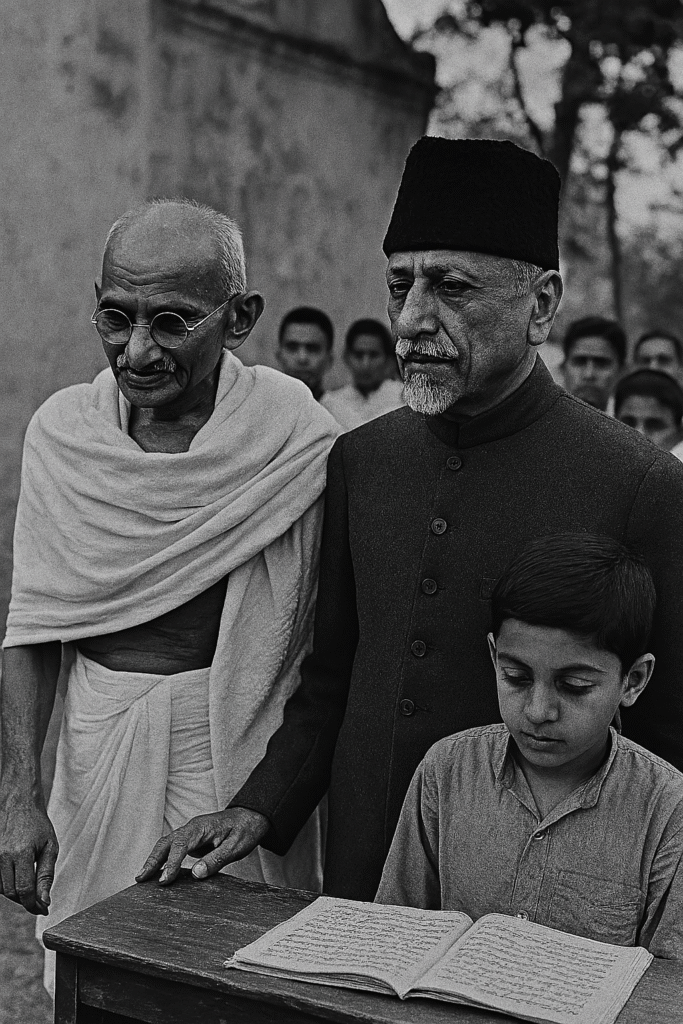
His childhood was not a prelude—it was a prophecy. It foretold the rise of a man who would challenge empires, heal divisions, and build institutions. Maulana Abul Kalam Azad’s early life was not just about dates and places—it was about the awakening of a soul destined to serve a nation.
🖋️ Maulana Abul Kalam Azad: The Pen That Shook Empires (1905–1916)
Maulana Abul Kalam Azad was not forged in silence—he was born in the fire of ideas. Between 1905 and 1916, he transformed from a quiet scholar into a revolutionary journalist whose words rattled colonial foundations. These years were not just chapters in his life—they were the awakening of a voice that refused to be silenced.
🔥 1905: The Partition That Sparked a Patriot
In 1905, the British government partitioned Bengal under the guise of administrative convenience. But for Maulana Abul Kalam Azad, this act was a calculated attempt to divide Hindus and Muslims. It was a moment of betrayal—and awakening. The young Azad, barely 17, saw through the colonial strategy. He realized that India’s freedom would never come from petitions—it would come from passion, unity, and resistance.
This year marked a turning point. Maulana Abul Kalam Azad began engaging with nationalist leaders, reading revolutionary literature, and questioning the status quo. He was deeply influenced by the Swadeshi Movement and the writings of Bankim Chandra Chatterjee. But unlike many, Azad didn’t just absorb ideas—he began crafting his own. His mind was a furnace, and his pen was ready.
🗞️ 1912: The Birth of Al-Hilal—A Paper with a Pulse
By 1912, Maulana Abul Kalam Azad was no longer a passive observer. He launched Al-Hilal, an Urdu weekly that would become one of the most powerful voices of anti-colonial resistance. But Al-Hilal was more than a newspaper—it was a movement. It blended Islamic philosophy, nationalist fervor, and poetic fire into a publication that electrified readers across India.
Maulana Abul Kalam Azad used Al-Hilal to challenge British policies, expose communal manipulation, and call for Hindu-Muslim unity. His writing was bold, lyrical, and unapologetically defiant. He quoted the Quran and Rousseau, weaving spiritual depth with political urgency. For many Indians, Al-Hilal was not just news—it was nourishment.
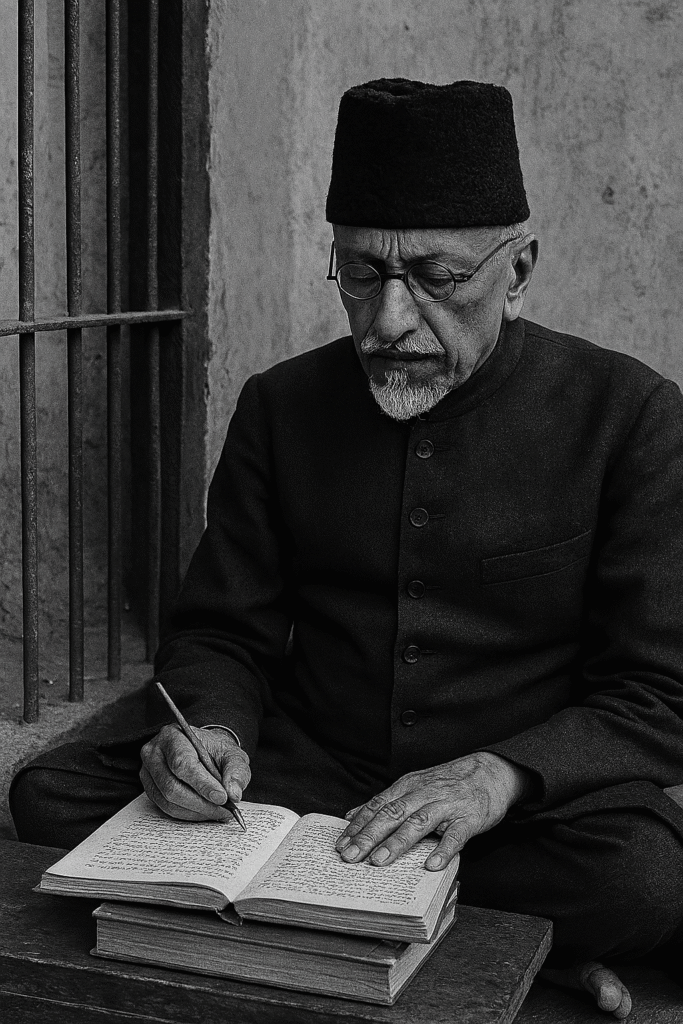
The British were alarmed. They saw in Maulana Abul Kalam Azad a threat not just to their rule, but to their narrative. His words were uncontainable, and his readership was growing. Al-Hilal became a symbol of intellectual rebellion, and Azad became its prophet.
🚫 1914: The Banning of Al-Hilal—But Not the Voice
In 1914, the British struck back. They banned Al-Hilal, citing sedition and inflammatory content. But Maulana Abul Kalam Azad was not a man who bowed to censorship. Within months, he launched Al-Balagh, another Urdu weekly that continued the fight. If Al-Hilal was fire, Al-Balagh was thunder.
Al-Balagh carried the same spirit—calling for independence, unity, and intellectual awakening. Maulana Abul Kalam Azad sharpened his critique, targeting not just colonial policies but also the complacency of Indian elites. He urged youth to rise, Muslims to unite with Hindus, and scholars to speak truth to power.
His journalism was not just political—it was poetic. He wrote with rhythm, rage, and reverence. Every issue of Al-Balagh was a manifesto of freedom, and every article was a call to conscience.
⛓️ 1916: Imprisoned, But Never Silenced
In 1916, the British arrested Maulana Abul Kalam Azad for sedition. He was sent to Ranchi, where he spent over a year in solitary confinement. But even in prison, his mind remained free. He wrote, reflected, and refined his vision for India. The silence of the cell became the echo chamber of his soul.
This imprisonment was not a defeat—it was a declaration. Maulana Abul Kalam Azad emerged stronger, more resolute, and more revered. His sacrifice became a symbol of intellectual courage, and his name became synonymous with resistance.
🕊️ Legacy of the Pen
Between 1905 and 1916, Maulana Abul Kalam Azad proved that revolutions don’t always need rifles—sometimes, they just need ink. His journalism laid the foundation for a new kind of nationalism—one that was inclusive, intellectual, and inspired. He didn’t just inform India—he ignited it.
Maulana Abul Kalam Azad remains a towering figure in India’s freedom movement, not just for his political role but for his moral clarity. His writings continue to inspire generations, reminding us that truth, when spoken with conviction, can shake empires.
Sources: Wikipedia, Britannica, Adda247.
🏛️ Maulana Abul Kalam Azad: Architect of India’s Freedom Struggle (1920–1946)
🔥 1920: The Khilafat & Non-Cooperation Movements—Faith Meets Freedom
In 1920, Maulana Abul Kalam Azad joined forces with Mahatma Gandhi, embracing the twin flames of the Khilafat Movement and the Non-Cooperation Movement. For Azad, this wasn’t just political—it was personal. The Khilafat Movement, aimed at protecting the Ottoman Caliphate, resonated deeply with Indian Muslims. But Azad saw beyond religious sentiment. He believed that India’s freedom required Hindu-Muslim unity, and the Khilafat cause was a bridge.
Maulana Abul Kalam Azad used his eloquence and scholarship to rally support. His speeches were thunderous, his writings electric. He urged Muslims to see India as their homeland, not just a temporary refuge. His call was clear: “Freedom is indivisible. Either we all rise, or we all fall.”
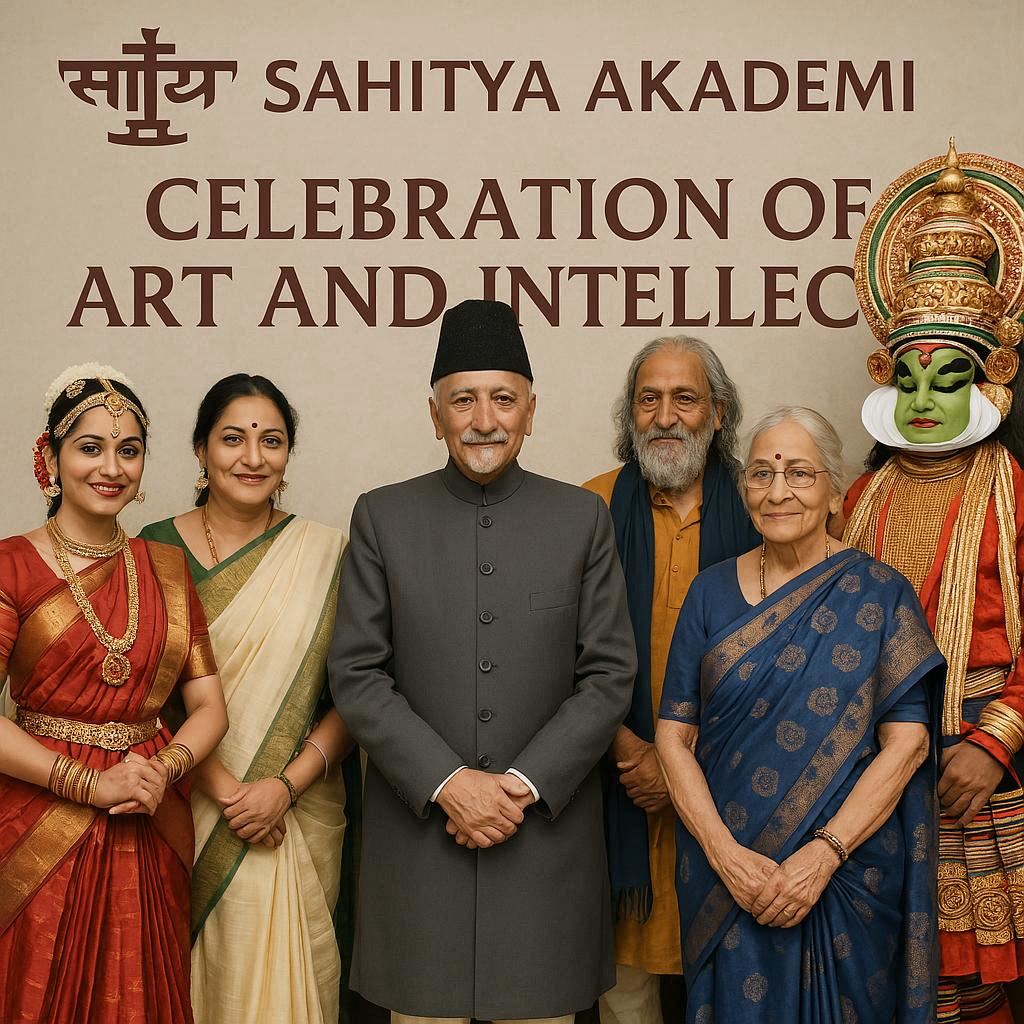
The Non-Cooperation Movement gave Azad a national platform. He renounced British titles, boycotted colonial institutions, and encouraged civil disobedience. His leadership was not loud—it was luminous. He became a symbol of intellectual resistance, blending Islamic ethics with Gandhian strategy.
🏆 1923: Youngest President of the Indian National Congress—A Voice of Vision
At just 35 years old, Maulana Abul Kalam Azad was elected President of the Indian National Congress in 1923—the youngest ever to hold the position. This was not a ceremonial role. It was a declaration that India’s future would be shaped by thinkers, not just fighters.
Azad’s presidency came at a time of ideological flux. The Congress was torn between moderates and radicals, between constitutionalists and revolutionaries. But Maulana Abul Kalam Azad stood firm. He advocated for non-violent resistance, but also demanded uncompromising self-rule.
His speeches during this period were masterclasses in clarity and conviction. He spoke of India as a shared inheritance, not a divided geography. He reminded the nation that freedom without fraternity was hollow, and that education was the key to emancipation.
⛓️ 1930: Civil Disobedience & Imprisonment—Chains Couldn’t Silence Him
In 1930, Maulana Abul Kalam Azad was arrested during the Civil Disobedience Movement, launched by Gandhi to protest the Salt Tax and British economic exploitation. Azad’s arrest was not unexpected—but it was symbolic.
He was imprisoned for his role in mobilizing protests, writing incendiary articles, and refusing to bow to colonial authority. But even behind bars, Maulana Abul Kalam Azad remained a beacon. He wrote extensively, reflected deeply, and emerged with a renewed vision for India’s future.
His imprisonment highlighted a truth: Azad’s power lay not in his position, but in his principles. He was not just a leader—he was a lighthouse.
🕊️ 1940–1946: Congress Presidency During WWII—Steering Through Storms
From 1940 to 1946, Maulana Abul Kalam Azad served again as President of the Indian National Congress, during the most turbulent years of World War II and the Quit India Movement. This period tested every leader—and Azad passed with grace and grit.
He opposed India’s forced involvement in WWII without consultation. He demanded that Britain recognize India’s right to self-determination. His stance was bold, especially as communal tensions rose and the idea of Partition began to gain traction.
Maulana Abul Kalam Azad used his presidency to defend secularism, promote unity, and challenge imperial arrogance. He warned that dividing India would be a historic mistake, and that freedom must be inclusive, or it would be incomplete.
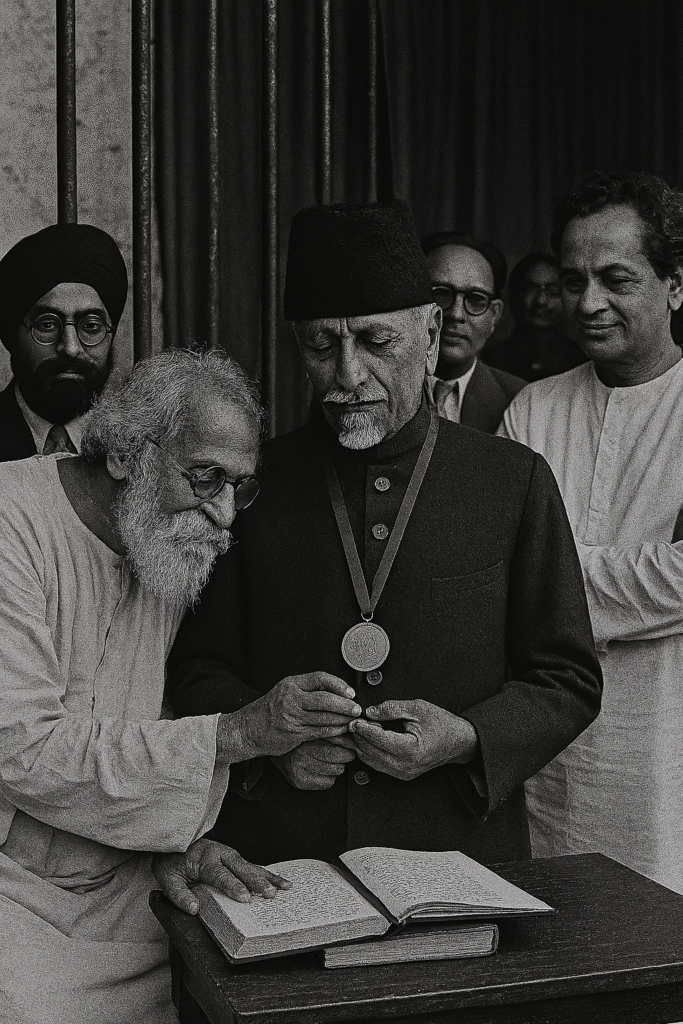
“He didn’t offer promises. He offered presence.”
His leadership during these years was marked by strategic brilliance and moral clarity. He navigated internal Congress debates, external British pressure, and rising communalism—all while holding the torch of unity high.
🚫 1942–1945: Quit India Movement & Imprisonment—The Price of Principle
In 1942, the Quit India Movement erupted—a mass civil disobedience campaign demanding immediate British withdrawal. Maulana Abul Kalam Azad, alongside Gandhi, Nehru, and other leaders, was arrested and imprisoned until 1945.
This was Azad’s longest incarceration. But it was also his most profound. He used this time to write, most notably his memoir “India Wins Freedom”, which offers a candid account of the freedom struggle and his role in it.
Maulana Abul Kalam Azad’s imprisonment was not just a punishment—it was a pilgrimage. He emerged with deeper insights, stronger resolve, and an unshakable belief that India’s destiny lay in unity, education, and moral leadership.
🌟 Legacy of Leadership
Between 1920 and 1946, Maulana Abul Kalam Azad proved that true leadership is not about dominance—it’s about dignity. He led with intellect, empathy, and unwavering commitment to India’s pluralistic soul.
His role in the freedom struggle was not confined to speeches or protests—it was embedded in every policy, every movement, every moment of resistance. He was the moral compass of the Congress, the voice of reason in chaos, and the architect of India’s secular foundation.
Maulana Abul Kalam Azad remains one of the most revered figures in Indian history—not just for what he did, but for how he did it. With grace, grit, and greatness.
🏛️ Maulana Abul Kalam Azad: The Architect of India’s Intellectual Freedom (1946–1958)
🕊️ 1946: The Constituent Assembly—Unity in the Face of Division
In 1946, as India stood on the brink of independence, Maulana Abul Kalam Azad was appointed to the Constituent Assembly, the body responsible for drafting the Indian Constitution. But for Azad, this was more than a political appointment—it was a moral mission.
The country was boiling with communal tension. The idea of Partition was gaining traction. But Maulana Abul Kalam Azad stood firm. He believed that India’s strength lay in its diversity, and that Hindu-Muslim unity was not optional—it was essential.
In the Assembly, Azad spoke with clarity and compassion. He reminded leaders that freedom without fraternity would be hollow, and that a divided India would be a wounded India. His speeches were not just political—they were poetic, philosophical, and profoundly human.
He argued for equal rights, secular governance, and inclusive citizenship. He envisioned an India where religion would never be a barrier to opportunity, and where education would be the bridge between communities.
Maulana Abul Kalam Azad’s presence in the Constituent Assembly was a stabilizing force. He didn’t just help draft the Constitution—he helped shape its soul.
🎓 15 August 1947: India’s First Minister of Education—A New Dawn
When India finally gained independence on 15 August 1947, Jawaharlal Nehru appointed Maulana Abul Kalam Azad as the first Minister of Education. It was a historic moment—not just for Azad, but for the nation.
Azad accepted the role with humility and urgency. He knew that political freedom was only the beginning. True independence would come only when every Indian child had access to knowledge, dignity, and opportunity.
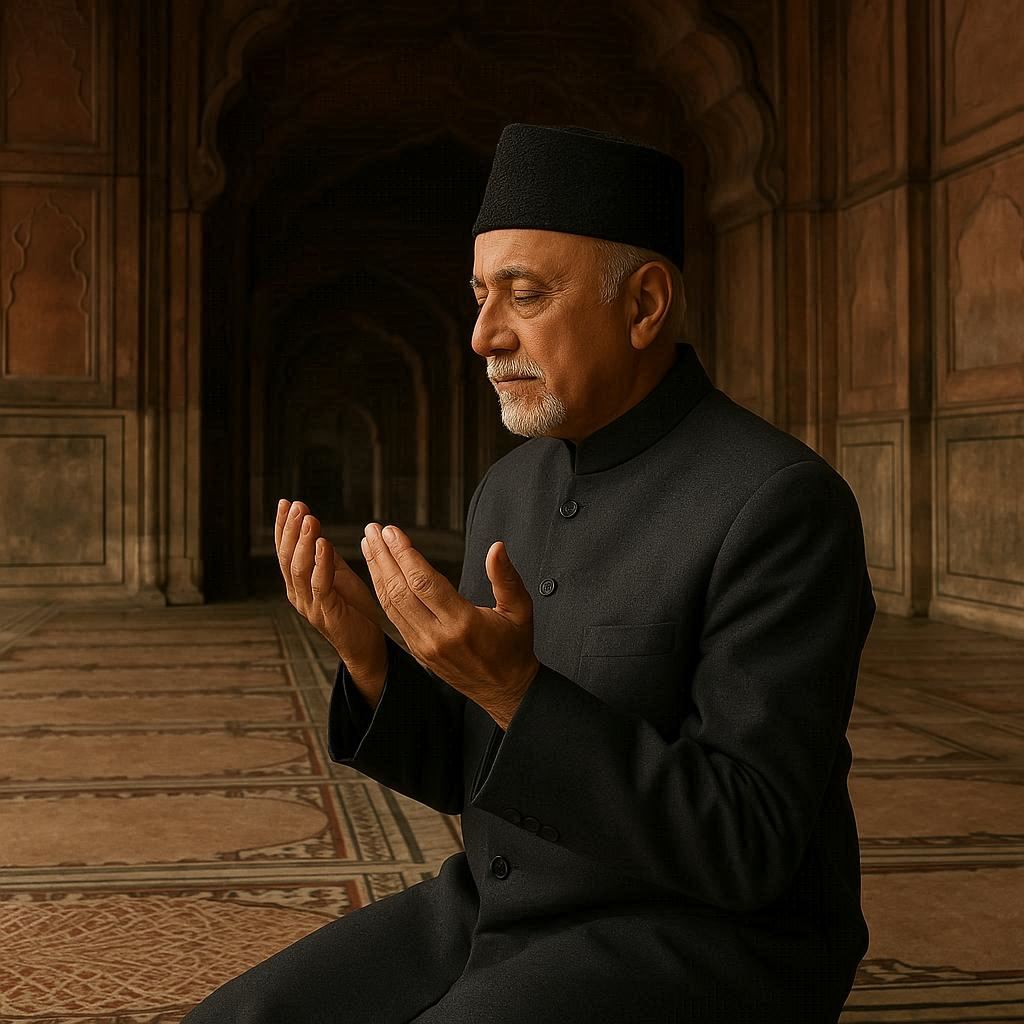
His vision was bold: “Education imparted by heart can bring revolution in the society.” He believed that schools were temples, and that teachers were the true nation-builders.
Maulana Abul Kalam Azad immediately set to work. He launched programs to universalize primary education, promote adult literacy, and build institutions that would rival the best in the world. He didn’t just talk about reform—he implemented it.
🏗️ 1947–1958: Building India’s Intellectual Infrastructure
For over a decade, from 1947 to 1958, Maulana Abul Kalam Azad served as India’s Education Minister, laying the foundation for a modern, inclusive, and secular education system. His contributions were monumental:
- Indian Institutes of Technology (IITs): Azad championed the creation of IITs to foster scientific excellence and global competitiveness. Today, these institutions are among the most respected in the world.
- University Grants Commission (UGC): He established the UGC to regulate and elevate higher education standards across India.
- Sahitya Akademi, Lalit Kala Akademi, Sangeet Natak Akademi: Azad believed that culture was the heartbeat of a nation. These institutions were created to preserve and promote India’s literary, artistic, and musical heritage.
- Promotion of Technical and Vocational Education: He emphasized the need for practical skills, ensuring that education was not just theoretical but transformative.
- Focus on Minority Education: Azad ensured that Muslims, Dalits, and other marginalized communities had access to quality education. He believed that no child should be left behind.
- National Education Day: In honor of his legacy, 11 November—his birthday—is celebrated as National Education Day in India.
Throughout his tenure, Maulana Abul Kalam Azad remained committed to secularism, inclusivity, and excellence. He resisted communal pressures, defended academic freedom, and inspired generations of educators.
🌟 Legacy of a Visionary
Maulana Abul Kalam Azad’s role in independent India was not just administrative—it was transformational. He didn’t just build institutions—he built ideals. He didn’t just promote education—he promoted enlightenment.
His legacy lives on in every classroom, every textbook, and every student who dares to dream. He proved that freedom without education is fragile, and that a nation without knowledge is a nation without direction.
Maulana Abul Kalam Azad remains one of India’s greatest minds—not just for what he taught, but for how he lived. With humility, courage, and an unshakable belief in the power of learning.
Sources: Wikipedia, PWOnlyIAS, Britannica.
🌟 Maulana Abul Kalam Azad: The Final Flame of a Timeless Torch (1956–1958)
🏅 1956: Bharat Ratna—A Nation Bows to Its Scholar-Saint
In 1956, Maulana Abul Kalam Azad was awarded the Bharat Ratna, India’s highest civilian honor. It was not just a medal—it was a moment of national reflection. The award recognized a man who had given his life not for power, but for purpose. A man who had fought for India’s soul with words, wisdom, and unwavering will.
By this time, Maulana Abul Kalam Azad had already served nearly a decade as India’s first Education Minister, laying the foundation for institutions like the IITs, UGC, and Sahitya Akademi. He had guided the nation through its most fragile years, advocating for secularism, inclusivity, and intellectual freedom.
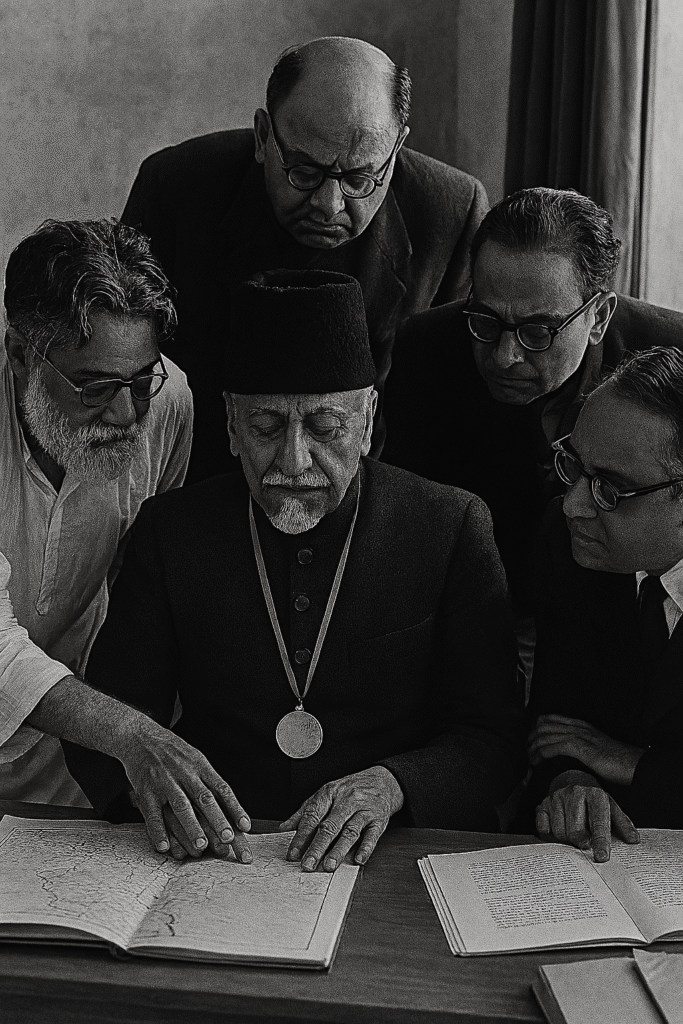
“Blueprinting India’s academic soul—one map, one mind, one mission.”
The Bharat Ratna was a fitting tribute. But for Azad, the real reward was seeing millions of Indian children entering schools, marginalized voices finding platforms, and a new India rising on the pillars of knowledge. He accepted the honor with humility, reminding the nation that true greatness lies in service, not in ceremony.
🕯️ 1957–1958: The Quiet Before the Farewell
As the years drew to a close, Maulana Abul Kalam Azad continued to work tirelessly. Despite declining health, he remained active in Parliament, representing Rampur and later Gurgaon. He continued to write, mentor, and speak—his voice still carrying the same fire that once echoed through the pages of Al-Hilal.
He was deeply concerned about the rising communal tensions and the erosion of the secular fabric he had fought so hard to preserve. In private conversations and public addresses, he urged the youth to protect India’s unity, to value education, and to resist the politics of division.
Even as his body weakened, his spirit remained indomitable. Friends recall how Maulana Abul Kalam Azad would spend hours in his study, surrounded by books, writing with the same intensity that had once shaken empires. He was preparing his final gift to the nation—his memoir, “India Wins Freedom”, a candid, courageous account of the independence struggle and the moral dilemmas that shaped it.
🕊️ 22 February 1958: The Nation Mourns Its Conscience Keeper
On 22 February 1958, Maulana Abul Kalam Azad passed away in Delhi due to a stroke. He was 69 years old. The news sent a wave of grief across the country. India had lost not just a leader, but a moral compass, a visionary, and a voice of reason.
His funeral was attended by thousands—leaders, students, scholars, and ordinary citizens. He was laid to rest near the Jama Masjid in Delhi, a place that symbolized his lifelong connection to faith, community, and the soul of the nation.
But even in death, Maulana Abul Kalam Azad was not silent. His ideas, his writings, and his institutions continued to speak. His legacy was not buried—it was planted.
📜 Legacy: The Eternal Flame of Knowledge and Unity
The legacy of Maulana Abul Kalam Azad is not confined to textbooks—it lives in every Indian classroom, every Constitution preamble, and every citizen who believes in freedom with fraternity.
- National Education Day: His birthday, 11 November, is celebrated as National Education Day, honoring his vision that education is the foundation of democracy.
- Cultural Institutions: The Sahitya Akademi, Lalit Kala Akademi, and Sangeet Natak Akademi continue to nurture India’s artistic soul—just as Azad envisioned.
- IITs and UGC: The institutions he built have produced generations of scientists, thinkers, and leaders who shape not just India, but the world.
- Secularism and Unity: In an age of polarization, Azad’s call for Hindu-Muslim unity and inclusive nationalism remains more relevant than ever.
Maulana Abul Kalam Azad’s life was a masterclass in leadership without ego, faith without fanaticism, and patriotism without prejudice. He taught India that true freedom is not just political—it is intellectual, spiritual, and moral.
🧭 The Final Word
Maulana Abul Kalam Azad did not seek monuments—he built minds. He did not chase power—he empowered others. His final years were not a sunset—they were a sunrise for generations to come.
As we walk through the corridors of our schools, scroll through our history, or speak of unity in diversity, we are walking in the footsteps of Maulana Abul Kalam Azad. His voice may have fallen silent on 22 February 1958, but his message still echoes: “Education imparted by heart can bring revolution in the society.”
Let us not just remember him—let us live him.
Sources:
Maulana Azad – Wikipedia
Adda247 – Biography of Maulana Abul Kalam Azad
🏛️ Legacy of Maulana Abul Kalam Azad: Building Minds, Bridging Hearts, Shaping Culture
🎓 Architect of Modern Indian Education
Maulana Abul Kalam Azad, India’s first Education Minister, believed that education was the true currency of freedom. From 1947 to 1958, he laid the foundation for a system that would democratize learning, elevate scientific inquiry, and preserve cultural wisdom.
He rejected the colonial model of elitist education and envisioned a National System of Indian Education that was inclusive, secular, and rooted in Indian values. Azad believed that “a nation’s wealth lies not in its banks, but in its schools.” His policies emphasized:
- Universal primary education for all children, regardless of caste, creed, or gender
- Adult literacy programs to empower the masses
- Vocational and technical education to build a skilled workforce
- Higher education reforms, including the establishment of the University Grants Commission (UGC)
- Scientific excellence, leading to the creation of the Indian Institutes of Technology (IITs)
Azad’s educational philosophy was holistic. He saw education as a means to cultivate truth, justice, cooperation, and courage. His vision continues to guide India’s academic institutions and policy frameworks, including the National Education Policy 2020.
🕊️ Champion of Hindu-Muslim Unity
Throughout his life, Maulana Abul Kalam Azad stood as a pillar of communal harmony. He believed that India’s strength lay in its diversity, and that freedom must be shared by all communities.
During the Khilafat and Non-Cooperation Movements, Azad worked tirelessly to unite Hindus and Muslims under a common banner of resistance. In the Constituent Assembly, he opposed the idea of Partition, warning that it would tear apart centuries of coexistence.
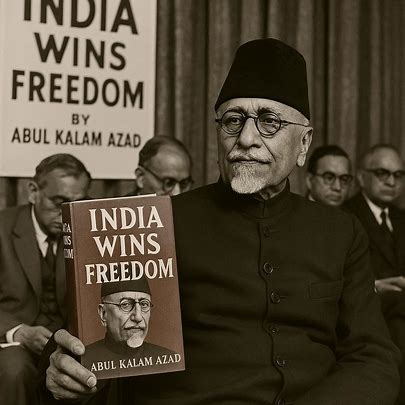
“He didn’t offer promises. He offered presence.”
His speeches were powerful reminders of India’s pluralistic soul. He declared:
“I am proud to be an Indian. I am part of that indivisible unity that is Indian nationality.”
Azad’s commitment to unity was not just political—it was spiritual. He saw all religions as paths to truth and believed that secularism was essential for national integrity. His legacy remains a beacon for those who seek harmony in a divided world.
🎨 Visionary Behind Cultural Institutions
Maulana Abul Kalam Azad understood that freedom without culture is incomplete. He believed that India’s artistic heritage was a source of pride, identity, and resilience. As Education Minister, he spearheaded the creation of three iconic institutions:
- Sahitya Akademi – to promote Indian literature in all languages
- Sangeet Natak Akademi – to preserve and celebrate music, dance, and drama
- Lalit Kala Akademi – to nurture visual arts and artists across India
These institutions were not just bureaucratic bodies—they were temples of creativity. Azad ensured that they were inclusive, accessible, and representative of India’s rich cultural mosaic.
He championed the idea that art is a form of resistance, and that culture must be protected as fiercely as borders. Today, these Akademis continue to honor his vision by supporting artists, writers, and performers who shape India’s cultural narrative.
🌟 The Enduring Flame
Maulana Abul Kalam Azad’s legacy is not confined to history—it lives in every classroom, every Constitution preamble, and every cultural performance. He taught India that true freedom is intellectual, spiritual, and artistic.
His birthday, 11 November, is celebrated as National Education Day, a tribute to his belief that education is the foundation of democracy. His writings, speeches, and institutions continue to inspire generations.
Azad’s life was a masterclass in leadership without ego, faith without fanaticism, and patriotism without prejudice. He remains one of India’s greatest minds—not just for what he built, but for what he believed.
🕊️ Conclusion: Maulana Abul Kalam Azad—A Legacy That Lives Beyond Time
In the grand narrative of India’s freedom and formation, Maulana Abul Kalam Azad stands not merely as a chapter—but as a conscience. His life was a symphony of intellect, resistance, and compassion. From the dusty streets of Calcutta to the halls of the Constituent Assembly, from the fiery pages of Al-Hilal to the quiet corridors of Parliament, Maulana Abul Kalam Azad shaped India not with weapons, but with wisdom.
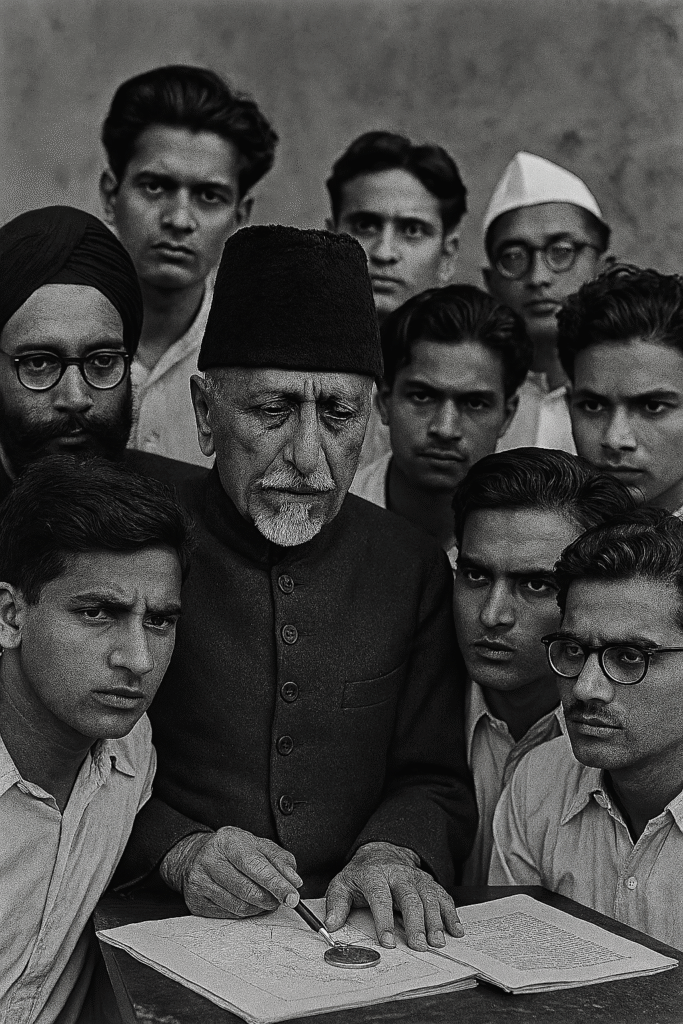
“He lit the fire in their eyes. They carried it to history.”
He was the architect of modern Indian education, a visionary who believed that true freedom begins in the classroom. His relentless pursuit of inclusive learning gave birth to institutions like the IITs, UGC, and Sahitya Akademi—pillars that continue to uphold India’s intellectual and cultural identity. For Maulana Abul Kalam Azad, education was not a privilege—it was a promise. A promise to every child, every community, and every generation that knowledge would be the light guiding India’s future.
But his legacy goes beyond policy and infrastructure. Maulana Abul Kalam Azad was a champion of Hindu-Muslim unity, a voice of reason in an era of division. He opposed Partition not out of politics, but out of principle. He believed that India’s soul was plural, and that its strength lay in its diversity. His speeches, rich with emotion and clarity, still echo in the hearts of those who dream of an India united not by religion, but by purpose.
As India’s first Education Minister, Maulana Abul Kalam Azad laid the foundation for a secular, inclusive, and forward-looking nation. He didn’t just build institutions—he built ideals. He didn’t just teach—he transformed. His leadership was marked by humility, his intellect by depth, and his patriotism by empathy.
Even in his final years, Maulana Abul Kalam Azad remained a guiding light. The Bharat Ratna awarded to him in 1956 was not just a medal—it was a mirror reflecting the nation’s gratitude. When he passed away in 1958, India didn’t just lose a leader—it lost a moral compass. Yet, his legacy was not buried—it was planted. It continues to bloom in every Constitution preamble, every school bell, and every citizen who believes in freedom with fraternity.
Today, as we walk through the corridors of our schools, scroll through our history, or speak of unity in diversity, we are walking in the footsteps of Maulana Abul Kalam Azad. His life reminds us that revolutions begin with reflection, and that the most powerful weapon against oppression is a well-educated mind.
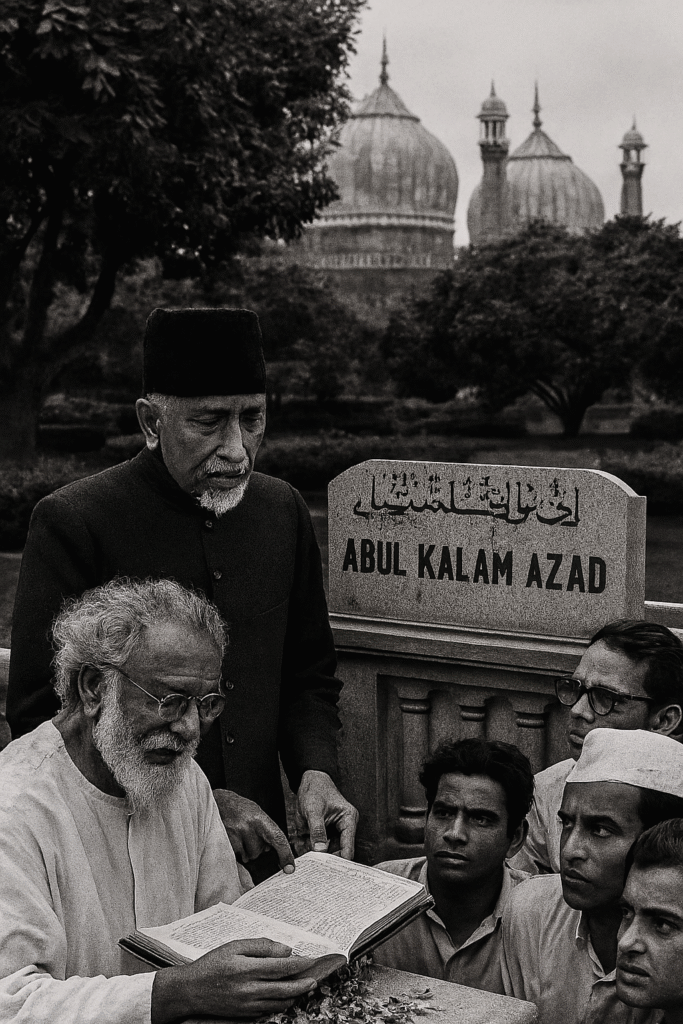
“Legacy etched in stone. Reverence blooming in silence.”
Let us not merely remember Maulana Abul Kalam Azad—let us revive him. In our policies, our classrooms, our conversations. Let us carry forward his dream of an India where every child learns, every citizen thinks, and every community thrives.
For in the words of Maulana Abul Kalam Azad himself:
“Education imparted by heart can bring revolution in the society.”
Internal Links: 1.https://historyverse7.com/lala-lajpat-rai/ 2.https://historyverse7.com/sardar-vallabhbhai-patel/
External Links: 1.http://makaias.gov.in/biography.html 2.https://www.britannica.com/biography/Abul-Kalam-Azad
📘 FAQ: Understanding Maulana Abul Kalam Azad
1. Why is Maulana Abul Kalam Azad called the soul of secular India, not just its scholar?
Ans: Maulana Abul Kalam Azad wasn’t merely a scholar—he was the emotional anchor of India’s secular vision. He believed that freedom without unity was hollow, and secularism was the only path to national integrity. His speeches in the Constituent Assembly weren’t just political—they were spiritual declarations of shared destiny.
2. What made Maulana Abul Kalam Azad’s educational vision radically different from colonial models?
Ans: Unlike colonial systems that promoted elitism and exclusion, Maulana Abul Kalam Azad envisioned education as a tool of liberation. He wanted every Indian—regardless of caste, creed, or gender—to access knowledge that empowered, not just informed. His legacy birthed institutions like IITs and UGC with this inclusive spirit.
3. How did Maulana Abul Kalam Azad use journalism as a weapon of resistance?
Ans: Through Al-Hilal and Al-Balagh, Maulana Abul Kalam Azad turned the printed word into a revolutionary force. He fused Islamic philosophy with nationalist fire, challenging British narratives and awakening youth. His journalism wasn’t passive—it was poetic defiance.
4. What personal sacrifices did Maulana Abul Kalam Azad make for India’s unity?
Ans: Maulana Abul Kalam Azad opposed Partition, knowing it would fracture India’s soul. He faced isolation, criticism, and political backlash—but never compromised. His sacrifice wasn’t just political—it was emotional. He chose principle over popularity, unity over division.
5. Why is Maulana Abul Kalam Azad’s legacy more relevant today than ever before?
Ans: In an age of polarization, Maulana Abul Kalam Azad’s call for education, empathy, and unity is a timeless remedy. His belief that “education imparted by heart can bring revolution” reminds us that building minds is the first step to healing nations.
Share this content:

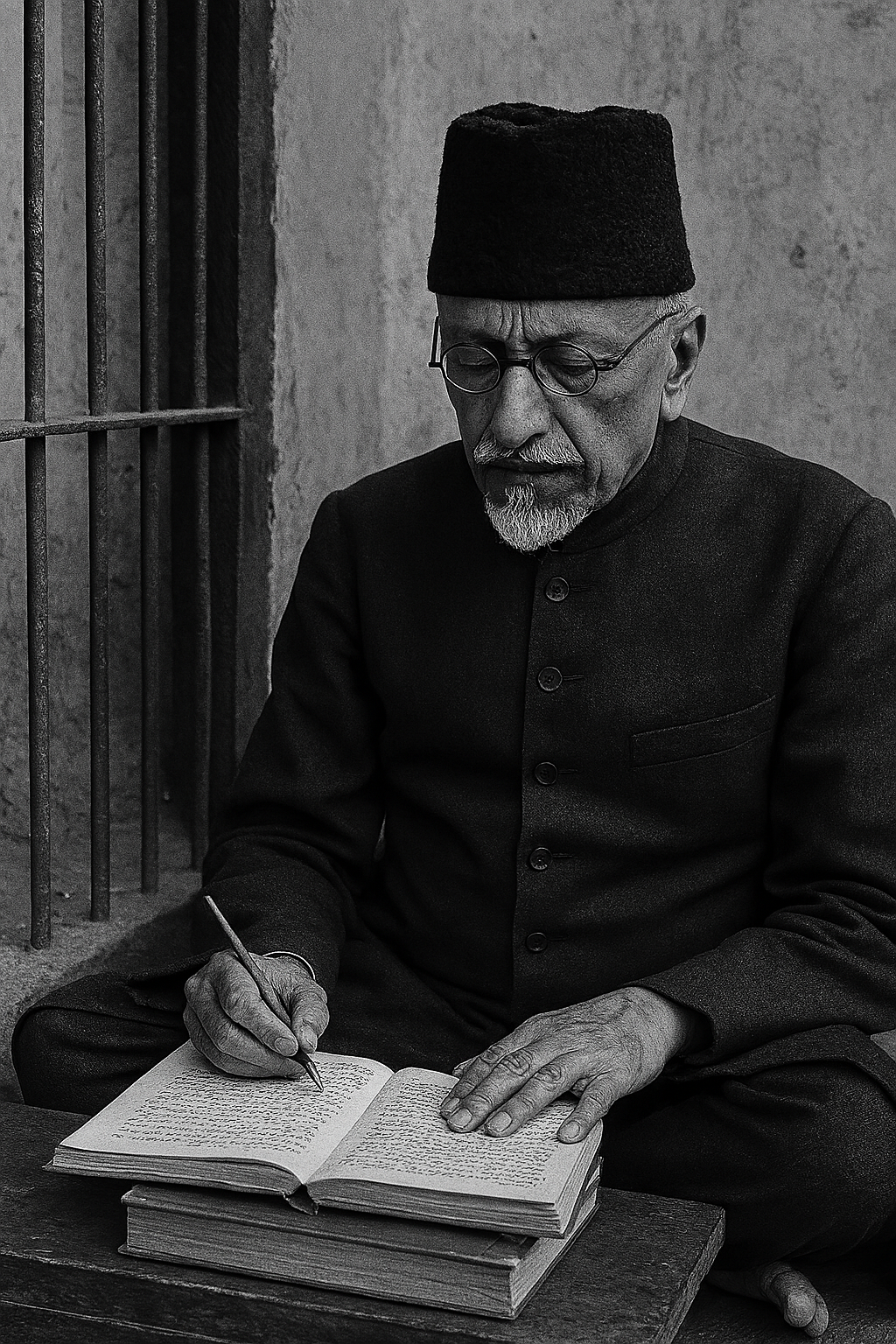
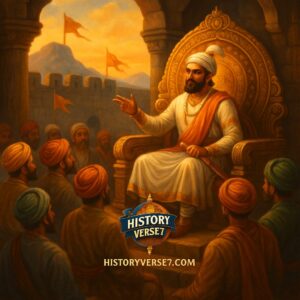
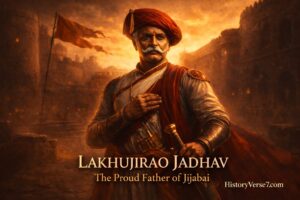

impressive…..very good 👍
He didn’t just teach history,he shaped it.🙌🏻🚩✨🔥
He declared:
“Do not forget that you are the inheritors of the legacy of India. This is your homeland. You are not guests here.”